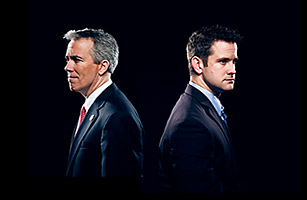
Joe Walsh didn’t go to Washington to make friends. “I came here ready to go to war,” says Walsh, a Republican freshman from Chicago’s suburbs. “The political powers will always try to get you to compromise your beliefs for the good of the team,” he says, sitting in his congressional office near a quilt inscribed with the Constitution’s preamble and the leather sofa that doubles as his bed. “The people didn’t send me here to compromise.”
Humility was once a hallmark of House newcomers, who were greeted with backwater committee assignments and indifference from their elders. Former House Speaker Tip O’Neill called newbies “bed wetters”; Sam Rayburn advised his freshmen that the way to “get along” was to “go along.” But that adage assumed the rookies wanted to rise to power in the chamber. At least some of the 87-member House Republican freshman class of 2010 seem more interested in burning it down.
But while revolutionary rhetoric propelled many of the freshmen to Washington, some believe their success will depend on making peace. “We need to get back to where we can talk about compromise,” says Adam Kinzinger, an Air National Guard pilot who represents a district southwest of Chicago. “It’s a word that people have kind of demonized.” For Republican newcomers, the cost-cutting fervor of the party’s conservative base comes with risks, not least that voters who say they’re ready for austerity will bristle when asked to relinquish programs and subsidies to which they’ve grown accustomed.
Like Walsh, Kinzinger unseated a Democrat in a district President Obama won in 2008. They’re both eager to rein in spending and roll back the reach of government. But they have very different philosophies about how to take on the Democratic Senate and the Obama White House in the months to come.